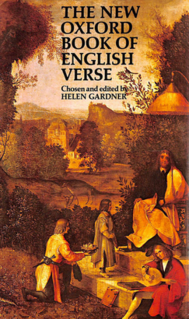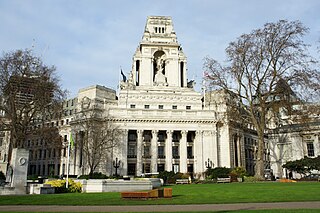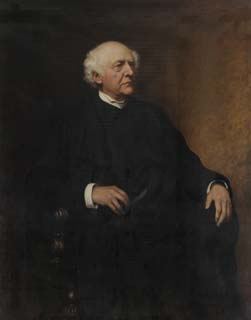The Master of the Revels was the holder of a position within the English, and later the British, royal household, heading the "Revels Office" or "Office of the Revels". The Master of the Revels was an executive officer under the Lord Chamberlain. Originally he was responsible for overseeing royal festivities, known as revels, and he later also became responsible for stage censorship, until this function was transferred to the Lord Chamberlain in 1624. However, Henry Herbert, the deputy Master of the Revels and later the Master, continued to perform the function on behalf of the Lord Chamberlain until the English Civil War in 1642, when stage plays were prohibited. The office continued almost until the end of the 18th century, although with rather reduced status.

The Golden Treasury of English Songs and Lyrics is a popular anthology of English poetry, originally selected for publication by Francis Turner Palgrave in 1861. It was considerably revised, with input from Tennyson, about three decades later. Palgrave excluded all poems by poets then still alive.
The Oxford Book of English Verse, 1250–1900 is an anthology of English poetry, edited by Arthur Quiller-Couch, that had a very substantial influence on popular taste and perception of poetry for at least a generation. It was published by Oxford University Press in 1900; in its india-paper form it was carried widely around the British Empire and in war as a 'knapsack book'. It sold close to 500,000 copies in its first edition. In 1939, the editor revised it, deleting several poems that he regretted including and adding instead many poems published before 1901 as well as poems published up to 1918. The second edition is now available online.

The New Oxford Book of English Verse 1250–1950 is a poetry anthology edited by Helen Gardner, and published in New York and London in 1972 by Clarendon Press. It was intended as a replacement for the older Quiller-Couch Oxford Book of English Verse. Selections were largely restricted to British and Irish poets.
These are Oxford poetry anthologies of English poetry, which select from a given period. See also The Oxford Book of Twentieth Century English Verse.
Sir William Tresham JP was an English lawyer and Speaker of the House of Commons.

Tower Hill is a complex city or garden square northwest of the Tower of London, in the London Borough of Tower Hamlets just outside the City of London boundary yet inside what remains of the London Wall — a large fragment of which survives toward its east.
The Chief Baron of the Exchequer was the first "baron" of the English Exchequer of Pleas. "In the absence of both the Treasurer of the Exchequer or First Lord of the Treasury, and the Chancellor of the Exchequer, it was he who presided in the equity court and answered the bar i.e. spoke for the court." Practically speaking, he held the most important office of the Exchequer of Pleas.
The Chancellor of the Exchequer of Ireland was the head of the Exchequer of Ireland and a member of the Dublin Castle administration under the Lord Lieutenant of Ireland in the Kingdom of Ireland. In early times the title was sometimes given as Chancellor of the Green Wax. The Chancellor was an MP in the Irish House of Commons.
This is a list of High Sheriffs of Lincolnshire.

This is a list of Sheriffs and High Sheriffs of Wiltshire.
Robert Pink D.D. was an English clergyman and academic, a supporter of William Laud as Warden of New College, Oxford, and later a royalist imprisoned by Parliament.
John Cottisford was an English churchman and academic, Rector of Lincoln College, Oxford from 1518.
Sir Edmund Walsingham was a soldier, Member of Parliament, and Lieutenant of the Tower of London during the reign of King Henry VIII.
The High Sheriff of Wexford was the British Crown's judicial representative in County Wexford, Ireland from the 16th century until 1922, when the office was abolished in the new Irish Free State and replaced by the office of Wexford County Sheriff. The sheriff had judicial, electoral, ceremonial and administrative functions and executed High Court Writs. In 1908, an Order in Council made the Lord-Lieutenant the Sovereign's prime representative in a county and reduced the High Sheriff's precedence. However the sheriff retained his responsibilities for the preservation of law and order in the county. The usual procedure for appointing the sheriff from 1660 onwards was that three persons were nominated at the beginning of each year from the county and the Lord Lieutenant then appointed his choice as High Sheriff for the remainder of the year. Often the other nominees were appointed as under-sheriffs. Sometimes a sheriff did not fulfil his entire term through death or other event and another sheriff was then appointed for the remainder of the year. The dates given hereunder are the dates of appointment. All addresses are in County Wexford unless stated otherwise.

The Chancellor of the Order of the Garter is an officer of the Order of the Garter.









